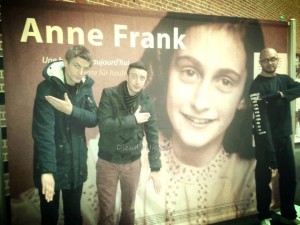 An op-ed piece in the NY Times today discusses the gesture invented by French comic Dieudonné M’Bala M’Bala, popularly known simply as Dieudonné. It’s a strange gesture, holding out the arm stiff, as in the Nazi salute, but pointing it down, and folding the other arm across the chest. Dieudonné has named it the quenelle, the French name of a large meat dumpling. It’s widely recognized as an anti-Semitic gesture, with its obvious echo of Nazism, although according to Dieudonné it’s just meant to be anti-system. That however stands in the face of Dieudonné’s public anti-Jewish statements and positions in the past. Dieudonné’s fans have recognized the true meaning of the gesture, using it in front of synagogues, the Berlin holocaust memorial, or as pictured here in front of an Anne Frank poster. Due to it being illegal in France to “incite racial hatred”, Dieudonné’s shows have been banned in France, creating quite an uproar.
An op-ed piece in the NY Times today discusses the gesture invented by French comic Dieudonné M’Bala M’Bala, popularly known simply as Dieudonné. It’s a strange gesture, holding out the arm stiff, as in the Nazi salute, but pointing it down, and folding the other arm across the chest. Dieudonné has named it the quenelle, the French name of a large meat dumpling. It’s widely recognized as an anti-Semitic gesture, with its obvious echo of Nazism, although according to Dieudonné it’s just meant to be anti-system. That however stands in the face of Dieudonné’s public anti-Jewish statements and positions in the past. Dieudonné’s fans have recognized the true meaning of the gesture, using it in front of synagogues, the Berlin holocaust memorial, or as pictured here in front of an Anne Frank poster. Due to it being illegal in France to “incite racial hatred”, Dieudonné’s shows have been banned in France, creating quite an uproar.
The author of the op-ed, Sylvain Cypel, sees the quenelle as pointing to something troubling in French society: “The Dieudonné affair is symptomatic of an insidious slide toward intolerance, but anti-Semitism is the least of it; racism and xenophobia manifest themselves more often as anti-Arab, anti-Muslim or anti-black.” She cites such examples as the black minister of justice, Christiane Taubira, being called a “monkey” or swastikas being spray-painted on the headstones of French Muslim soldiers. Not all intolerance is so blatant or ugly, the coded racism of the Front National now has a friendly face with Maxime Le Pen but the essential positions remain the same. One shouldn’t just point the finger at France. Unfortunately, the intolerance to Others (especially the Others having darker skin and a different religion) is wide-spread in Europe these days with far right, nationalistic political parties having significant popular support in a number of European countries. Those parties tend to also be opposed to the European Union. Let’s hope that, as has historically been the case, that this kind of far-right populism is tied to the bad economy and that once the European economy recovers, the political situation will change.